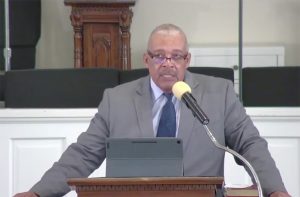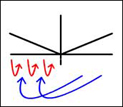Globalist Establishment Aspects of the George HW Bush Administration
updated May 30, 2021

This article explains establishment agendas of the presidential administration of George HW Bush.
Previously an ally of the United States, Saddam Hussein invaded Kuwait in 1990, which may have not happened if it where not for miscommunication between Iraq and the US Ambassador to Iraq. The Bush Administration’s subsequent attack on Iraq and the ensuing sanctions imposed devastating harm on the people of that country in the run-up to the second invasion in 2002.
Covert operations in Central America continued, as well as a 1989 US invasion of Panama where the US military attacked and destroyed primarily residential neighborhoods, killing 3 to 4 thousand people, most of whom were civilians.
George HW Bush helped to spearhead the implementation of NATFA, being a step toward the creation of a consolidated world government. NAFTA eliminated the majority of tariffs on products traded among the United States, Canada, and Mexico. It contained no provisions for labor rights, and it led to losses of US jobs as well as exploitive working conditions in Mexico. NAFTA also increased the US trade deficit with Mexico to 12 times its pre-NAFTA size.
This page is part of the article A Summary of Long Term Globalist Establishment Agendas of the Global Elite.
George HW Bush Neoconservative Agendas

Donald Rumsfeld shakes hands with Saddam Hussein during his visit to Iraq in 1983.
Previously an ally of the United States, Saddam Hussein invaded Kuwait in 1990, which may have not happened if it where not for miscommunication between Iraq and the US Ambassador to Iraq. The Bush Administration’s subsequent attack on Iraq and the ensuing sanctions imposed devastating harm on the people of that country in the run-up to the second invasion in 2002.
Covert operations in Central America continued, as well as a 1989 US invasion of Panama where the US military attacked and destroyed primarily residential neighborhoods, killing 3 to 4 thousand people, most of whom were civilians.
From a Peace Magazine article “In the Cradle of Civilization”:
...
WAR, SANCTIONS, AND MORE WAR
Saddam stepped up officially into the presidency in 1979, immediately eliminating a number of his enemies in the Baath Party who had been — according to him — plotting against him. Soon Iran was undergoing a revolution, which impaired the perpetually fraught relations between the two countries. In a serious miscalculation Saddam launched an invasion of Iran in September 1980, using the ongoing border clashes as a justification and expecting to win the war in short order. This proved to be far from the case. During eight years of fighting, Iraq would incur losses of hundreds of thousands of lives and the destruction of its economy. Iran bombed Iraq's oil infrastructure in the south and encouraged a new Kurdish uprising. By July 1988, when the war officially ended, Iraq's economy was shattered and it owed $80 billion to foreign countries.
Thereafter, Saddam set about trying to bring order back to the country, largely by attacking the Kurds again. On the world market, oil prices dropped at about that time, exacerbating Iraq's poor relations with Kuwait, whom Saddam accused of deliberately seeking to harm his economy. In fact, both Kuwait and the United Arab Emirates were producing more oil than OPEC had established as their quota. Saddam charged that this practice was keeping prices low, thereby reducing the revenue that Iraq desperately required for postwar reconstruction.
The Kuwaiti leadership rejected Saddam's demands and the US Ambassador to Iraq informed him that her government did not consider his quarrels any business of theirs. Yet, at the same time, both Britain and the United States seemed to urge the Kuwaitis to stand firm in the dispute with Iraq. In this morass of miscommunication, Saddam invaded Kuwait in August 1990, precipitating a crisis that would lead six months later to the invasion of his own country by the United States and its hastily-assembled coalition of allies — a military engagement called “Operation Desert Storm.” Saddam's armies never stood a chance.
The war lasted only 43 days, yet in that time the United States and its partners dropped bombs equivalent in power to five to seven of the atomic bombs that fell on Hiroshima. The planes flew more than 110,000 sorties, destroying Iraq's infrastructure — its roads, sewage, water systems, telephone and electricity grids, bridges, communications systems, and factories. According to a United Nations report on the aftermath of the war, the bombing reduced Iraq to a pre-industrial society.
The Kurds in the north and Shii in the south seized this as an opportunity to revolt against Saddam. They expected to set up a regime more favorable to their concerns or, in the case of the Kurds, an independent sovereign state. Both groups, like Saddam before them, proved to be misguided in their optimism. Despite his devastating defeat by the United States and other powers, Saddam Hussein was still a force to be reckoned with. He managed to crush both insurrections, killing thousands of Iraqi insurgents and forcing hundreds of thousands of others to flee. In response, the United States, France, and Britain defined a large zone in the north where no Iraqi aircraft would be allowed to fly. They also offered protection to those within the Kurdish zone of Iraq, allowing the inhabitants to set up an interim government. This de facto independence has remained in force; there Kurds rule themselves, speak their own language, collect their own taxes, and manage their own schools and finances.
Because of sanctions, the aftermath of the war in Iraq was far worse than it need have been. Immediately after its forces invaded Kuwait, the UN Security Council imposed severe economic sanctions and an embargo on Iraq, seeking to force Saddam to comply with its demands by withdrawing his military. When the war was over, the Security Council passed additional resolutions continuing the sanctions and embargo until Iraq dismantled its long- and medium-range missiles and its biological, nuclear, and chemical weapons. The verification of this process was to have been conducted by two organizations: the International Atomic Energy Agency, which had been inspecting Iraq's nuclear facilities since the 1970s, and a new United Nations Special Commission (UNSCOM) chaired by a Swede, Rolf Ekeus. A permanent UN monitoring system would be established to detect any Iraqi missile or nuclear installations.
...

The drug kingpin “Freeway Ricky Ross” became known as “The Wal-Mart of Crack” in Los Angeles during the 1980’s by becoming the largest supplier of drugs in the area, without his initially knowing that his source of drugs was a CIA operative connected to the Iran-Contra scandal associated with George Bush and Ronald Reagan.
This compilation of video clips from the documentary film “The American Drug War: The Last White Hope” details the circumstances of the connections between Ricky Ross and the CIA, showing how the connection was publicly exposed in the media and then largely forgotten by the public while CIA drug trafficking continues.
This compilation of video clips from the documentary film “The American Drug War: The Last White Hope” details the circumstances of the connections between Ricky Ross and the CIA, showing how the connection was publicly exposed in the media and then largely forgotten by the public while CIA drug trafficking continues.

This video clip details evidence of how Prescott Bush— the grandfather of George W. Bush, had major ties to Adolph Hitler and the Nazi party though being a partner in the American bank “Brown Brothers Harriman,” and involvement in the Union Banking Corporation, which were actually Nazi money laundering operations that had connections to many individuals and companies involved in the workings of the Nazi party.
George HW Bush Neoliberal Agendas
George HW Bush helped to spearhead the implementation of NATFA, being a step toward the creation of a consolidated world government. NAFTA eliminated the majority of tariffs on products traded among the United States, Canada, and Mexico. It contained no provisions for labor rights, and it led to losses of US jobs as well as exploitive working conditions in Mexico. NAFTA also increased the US trade deficit with Mexico to 12 times its pre-NAFTA size.
NAFTA from the Wikipedia page about George Bush
Bush’s administration, along with the Progressive Conservative Canadian Prime Minister Brian Mulroney, spearheaded the negotiations of the North American Free Trade Agreement (NAFTA), which would eliminate the majority of tariffs on products traded among the United States, Canada, and Mexico, to encourage trade amongst the countries. The treaty also restricts patents, copyrights, and trademarks, and outlines the removal of investment restrictions among the three countries.
The agreement came under heavy scrutiny amongst mainly Democrats, who charged that NAFTA resulted in a loss of US jobs. NAFTA also contained no provisions for labor rights; according to the Bush administration, the trade agreement would generate economic resources necessary to enable Mexico's government to overcome problems of funding and enforcement of its labor laws. Bush needed a renewal of negotiating authority to move forward with the NAFTA trade talks. Such authority would enable the president to negotiate a trade accord that would be submitted to Congress for a vote, thereby avoiding a situation in which the president would be required to renegotiate with trading partners those parts of an agreement that Congress wished to change. While initial signing was possible during his term, negotiations made slow, but steady, progress. President Clinton would go on to make the passage of NAFTA a priority for his administration, despite its conservative and Republican roots — with the addition of two side agreements — to achieve its passage in 1993.
The treaty has since been defended as well as criticized further. The American economy has grown 54% since the adoption of NAFTA in 1993, with 25 million new jobs created; this was seen by some as evidence of NAFTA being beneficial to the US. With talk in early 2008 regarding a possible American withdrawal from the treaty, Carlos M. Gutierrez, current United States Secretary of Commerce, writes, “Quitting NAFTA would send economic shock waves throughout the world, and the damage would start here at home.” But John J. Sweeney of The Boston Globe argues that “the US trade deficit with Canada and Mexico ballooned to 12 times its pre-NAFTA size, reaching $111 billion in 2004.”
The agreement came under heavy scrutiny amongst mainly Democrats, who charged that NAFTA resulted in a loss of US jobs. NAFTA also contained no provisions for labor rights; according to the Bush administration, the trade agreement would generate economic resources necessary to enable Mexico's government to overcome problems of funding and enforcement of its labor laws. Bush needed a renewal of negotiating authority to move forward with the NAFTA trade talks. Such authority would enable the president to negotiate a trade accord that would be submitted to Congress for a vote, thereby avoiding a situation in which the president would be required to renegotiate with trading partners those parts of an agreement that Congress wished to change. While initial signing was possible during his term, negotiations made slow, but steady, progress. President Clinton would go on to make the passage of NAFTA a priority for his administration, despite its conservative and Republican roots — with the addition of two side agreements — to achieve its passage in 1993.
The treaty has since been defended as well as criticized further. The American economy has grown 54% since the adoption of NAFTA in 1993, with 25 million new jobs created; this was seen by some as evidence of NAFTA being beneficial to the US. With talk in early 2008 regarding a possible American withdrawal from the treaty, Carlos M. Gutierrez, current United States Secretary of Commerce, writes, “Quitting NAFTA would send economic shock waves throughout the world, and the damage would start here at home.” But John J. Sweeney of The Boston Globe argues that “the US trade deficit with Canada and Mexico ballooned to 12 times its pre-NAFTA size, reaching $111 billion in 2004.”
Article Tree
| A Summary of Long Term Globalist Establishment Agendas of the Global Elite |
| Globalist Establishment Aspects of the George HW Bush Administration |








